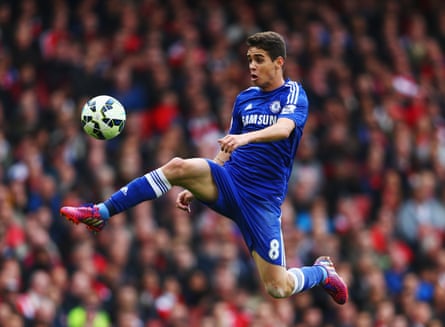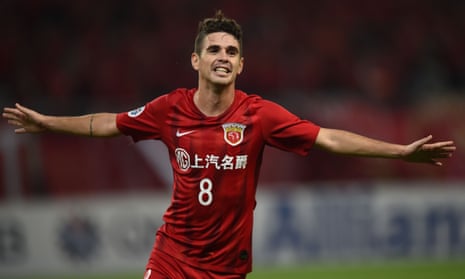Oscar left home very early in his life for football. And the further he went in his career, the further he got from home. Born in Americana, a small city in the state of São Paulo, he only had to travel 10 minutes to play for Santa Bárbara d’Oeste. He then moved to one of the state capital’s biggest teams, São Paulo FC, before signing for Internacional in Porto Alegre, Chelsea in London and now Shanghai SIPG, nearly 12,000 miles away from where he started.
Where next? “I don’t think about leaving China,” says the 29-year-old. “There is a great project for me here. But, to end my career, I would like to return to Chelsea. I built a beautiful story there and went to the Premier League very young, at a time when fans did not trust Brazilian players that much. I helped change that. I’ll be a bit older when I try this move again but, as I am playing very well, with good stats, I feel there is still a place for me at Chelsea.”
When Oscar signed for Chelsea in 2012, he was given the No 11 shirt, which had belonged to club legend Didier Drogba before he left for Shanghai Shenhua. When Drogba returned to Chelsea in 2014, he did not hit top form in pre-season so asked Oscar for a chat. “Drogba is a superstitious guy I think,” Oscar laughs. “He came to talk to me and gave me many compliments, saying I was the right player for the No 8 shirt. Of course, I would have made the change even if he just asked, but that kind of confidence helped me. I told him: ‘It’s your number. The change is already made and you don’t even have to ask’.” Oscar switched to No 8, the shirt Frank Lampard had worn before he left for Manchester City. “The funny thing is I did not feel the pressure of having the No 8 on my back because I already wore Drogba’s number,” says Oscar.
During nearly five years with Chelsea, Oscar played under five managers and won four trophies: two Premier League titles as well as the League Cup and Europa League. In his first year with the club, he scored Chelsea’s goal of the season – a beautiful curling strike in a 2-2 draw with Juventus in the Champions League. At the end of the season, he had to make a speech to the fans, a daunting prospect.
“Of course I was nervous,” he says. “I was learning English, but had to embrace the moment, and speak with the supporters and my colleagues. In the middle of it I felt I was not doing so well, as people started to laugh,” he says with a chuckle. “Maybe it’s because I was stalling and stuttering, saying too many words. But that’s how you learn the language: trying. It was part of what I had to do.
“I could take up all this interview talking about the good moments and memories I enjoyed at Chelsea, but I have two others that I appreciate the most: my first hat-trick, against MK Dons, and a game against Arsenal where I did not score but did eight slide tackles. The fans applauded me when I got subbed off and it felt as if I’d scored a hat-trick then too.”
Not everyone acclimatises to the pressure of playing for Chelsea immediately. Oscar signed for the club at the same time as Kevin De Bruyne, who became one of his first friends at the club. Mo Salah arrived in 2014 and showed his quality, but more during practice sessions than first-team games, which earned him the nickname the “training ground Messi”.
“De Bruyne even gave me an assist,” says Oscar. “There was a formation where [Eden] Hazard, De Bruyne and I played in midfield and it worked well. He only had a few chances, played well but then got injured. I guess that not being consistent at a club that had many options in the centre of the park meant he was not a good fit at the time. With Salah, it was different. He was unstoppable during practice, but always shy and quiet off the field. During the games, I guess he did not have the confidence that we saw at every club he played for after Chelsea, and especially now at Liverpool.”
Oscar thinks José Mourinho’s demanding management style may have affected De Bruyne and Salah. “Sometimes players don’t feel comfortable with that pressure. I liked it because it made me better. Mourinho helped me a lot and he is one of the best coaches in the world. He gives a lot of confidence to his players, but also wants to see them perform at the level of that trust.”

Oscar was a success at Chelsea but, when Shanghai came calling in 2016, he could not turn down the opportunity. The club paid Chelsea £52m for his signature and reportedly offered Oscar £400,000 a week in wages. “China has incredible financial power and sometimes makes offers that players can’t refuse,” he said at the time. “Every football player, or every person who works, wants to earn money to help their families. I came from a social background in Brazil that is very poor. We didn’t have anything. This is the fruit of my work.” Oscar’s father was killed in a traffic accident when he was three years old, which left his mother to raise their three children on her own. She made and sold clothes to provide for the family. Now Oscar can provide for everyone by playing football.
He believes he moved to Asia at the right time. Competition in the Chinese Super League is improving, with better players arriving every year. Across the continent, he says, the league is attracting a lot of attention and is known as the best in Asia. He won the league in 2018 and the Super Cup in 2019. Nevertheless, there are drawbacks. “It makes it harder to return to the Seleção, but I’m ready if the team needs me. Of course, it is a dream of mine, but I understand it is much more difficult now.”
He is enjoying the experience though, and has made the most of it with his wife and two young children. “Before the pandemic, I went to a lot of Asian cities and countries. It is like a new world for me. We love to travel. Shanghai is incredible; it’s an international city like São Paulo or London. It has everything – parks, restaurants, shows, a high quality of life, you name it. It’s great to be here.”
Of course, life has not been normal for the past year. Covid-19 reached Shanghai a year ago this week, but there are now only a handful of cases in the city. “It was rough here in China, but the government told us what to do and we followed them,” says Oscar. “Now it’s as if the coronavirus did not even exist. We have a normal life. China made the right efforts for its people. I’ve always thought the pandemic was a time to help each other. We helped other provinces here in China and I talk to my family every day in Brazil, telling them to keep looking out for their health.”
Oscar is enjoying his time in China and has a lengthy contract, but he still hopes to return to Chelsea to end his glittering career. After retirement will he move into coaching? “No, no. No coaching for me,” he laughs, “I’ve been travelling since I was 12 because of football. I want a job in the sport once I hang my boots up, but one that keeps me in one place. I need to be close to my family and loved ones. That’s what I want.”

Comments (…)
Sign in or create your Guardian account to join the discussion